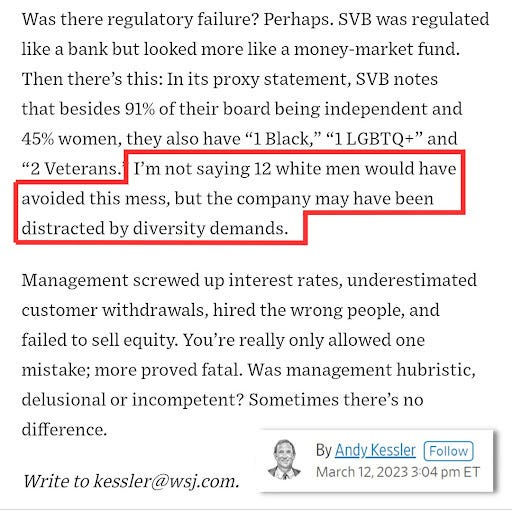No. 61. Are female board members to blame for SVB's failure?
My thoughts on recent events & how women show up in the corporate world
There's been a lot of talk and commentary the last few days about the Silicon Valley Bank failure, but this WSJ op-ed brings up a point that both irks me and makes me wonder: is this guy right?
First, does his hypothesis even align with other bank failures? For example, back in 2009, when the big banks that were deemed “too big to fail,” did indeed fail, who was on those boards?
Looking at 2008-2009 shareholder reports, each of the major banks appears to have had 1-2 women on their boards: Bank of America (2 women out of 7 total directors), Morgan Stanley (2 out of 12), Goldman Sachs (2 out of 13), and JPMorgan Chase (1 out of 4).
These women were academics, CEOs, investment bankers, start up founders, and on paper, seem to have just as much experience and knowledge as the men on the boards.
There is even some research that suggests adding just one woman on a company’s board, while keeping the board size unchanged, produces an ROI of 8 to 13 basis points.
So, if women and diverse board members are good additions to boards, why imply that they could be responsible for a company’s failure? Is there any merit to this claim?
I’ve never been on a corporate board or even attended a corporate board meeting, but I’m a first generation college graduate and attorney who has spent seven years in the corporate world and I work in two professions still known to be primarily male dominated (although we’re making progress!): accounting and law.
I’ve been in meetings and rooms where I’m the only woman or one of two or three in a room of men.
I’ve worked through the mindset shifts to overcome imposter syndrome that for years made me work harder than my peers because I didn’t feel like I belonged in my profession or at my firm.
But most of all, I became hyper aware of how differently many women show up at work compared to how men approach the workplace. It’s not a bad thing, but it can hinder our career progress. It’s like bringing a knife to a gun fight - you don’t stand a chance of surviving, let alone winning, if you don’t have the proper tools to engage.
Let me give you some personal examples to illustrate my point about how I often showed up at work as a woman and how it was different from how my male co-workers approached the same job + how this hindered my career growth.
A project gets brought up in a team meeting. It’s basically corporate busy work that needs to get done, but no one wants to do it - a male co-worker is asked if he can take it on. “I’m swamped with building up this new program and helping that team with their firm-wide initiative,” he says. I’m asked next, and although I’m working just as many hours as this co-worker, I say yes, because I feel like I have to.
My billable hours were so much higher than a male co-workers, and his start date was six months after mine, but we both got early promotions. When I started asking questions, I was told it was because he showed leadership qualities on a client project. Which is fair. But here’s the thing: the reason my bosses knew that? This guy talked about his responsibilities and accomplishments on this client engagement ALL THE TIME. He talked about the late nights he was pulling, the obstacles he ran into and how he solved all the problems. What he was doing was not any different from what I was doing on my client engagements, but I had stayed quiet, hoping someone would notice what I was accomplishing and reward me for it, not realizing that everyone was too busy with their own work to keep track of mine.
I’ve deferred to male colleagues to speak in meetings because they spoke with authority and I assumed they knew more than I knew and belonged more than I did, so I should stay quiet and observe (or be the note taker!).
I had a male partner explain to me as if I’m an eighth grader how to speak, dress and show up to a webinar even though I'm a 30-year-old, licensed attorney who has done dozens of on screen speaking engagements. He did not give the same spiel to the male panelist.
There were instances when I didn’t push back or speak up when I should have, but I didn’t want to take up more time in a meeting already running long, or I was worried I’d appear argumentative, aggressive, or demanding.
I’ve worked on growing out of this, because it was not only holding back my career progression, but it was also inadvertently hurting my team and the firm.
After all, each of us is hired for a purpose. We’re bringing something to the table. There’s a reason you’re in that meeting and in that room.
When we stay silent, we prevent or delay solving a problem that the team is struggling with and we don’t bring good ideas and innovative thinking to the table.
When we try to not come across as too much, we can leave our team members confused as to what exactly we’re asking of them or what our expectations are.
When we don’t stand our ground when we know what we’re trying to say is important, we leave the company exposed to potential risks.
We deprive ourselves and others of what we have to offer.
So, what does this have to do with women on corporate boards?
Well, I wonder if any of those women felt what I’ve experienced.
If imposter syndrome held them back from speaking up.
If they downplayed their accomplishments or experience as to not appear too egotistical.
If their input was overruled by comments to improve the bottom line or benefit shareholders at the expense of other things.
If eventually they just spoke up less and less because what they were saying wasn’t being heard or respected.
Maybe I’m projecting my own experiences on others. Maybe those women showed up fully confident and led the boards - they were after all seasoned executives, educated and accomplished professionals. I don’t know and I don’t want to speculate.
Neither do I want to bring down men or women; or make broad generalizations of either gender in the workplace. Because I can share dozens of positive examples of women who thrived in the corporate world and men who have helped me grow exponentially in my career.
So, what’s my point then?
Taylor Morrison, a real estate development company, recently announced it was launching a “first of its kind board fellowship program…designed to grant board training opportunities to under-represented diverse candidates.”
My firm has a similar initiative, where women who are interested in making partner can sign up to be part of a protege program where they’re mentored through the partner track.
In my opinion, these are the types of opportunities we need more of in the corporate world - probably more than any DEI type of quota.
Because at the end of the day, I don’t think it is as much the number of men or women on a board (or on a team or employed by a company), but how each of us shows up in our roles and how we equip and build each other up to succeed by recognizing that not all of us show up to work with equal opportunities to thrive.
Now, I don’t think there should be a presumption that just because she’s a woman or he comes from a diverse background that they must need extra coaching or a DEI initiative to succeed in their role or move up the corporate ladder. That kind of assumption would make me no different than the partner who assumed I didn’t know how to dress or show up for a webinar because I was a young woman.
Or the school district that insisted my siblings needed to be put into a special English as a Second Language program simply because they were bilingual. But they were born in the U.S. and spoke English fluently. My siblings didn’t need any extra programs to do well in school, but the district leadership encountered a minority (immigrants) and tried to do what they thought would help my siblings. In reality, being in an English learning program when they were already fluent in English would have only held them back.
It’s the same for women and other diverse groups in the corporate workplace. As corporate leaders, we should make coaching and training opportunities available to those who could benefit from them and want to participate.
And as women in the corporate workplace, it is up to us to be aware of where we need to grow to get to where we want to be in our careers and in life. And then, take advantage of those coaching and training initiatives to get ahead if and when you need to.
So, let’s go back to where we started: I disagree with Mr. Kessler.
I don’t think it is as much the diversity of the board, at least not in the terms of numbers, but more about equipping women and others from diverse backgrounds to excel in the roles they’re in and creating a diverse leadership pipeline by building an environment that is open to diversity of thinking and providing the tools, coaching, and mentorship needed for each member’s individual success within the company.
It’s one thing to have more women at the table. It’s quite another to have women at the table who confidently own their expertise and feel like they are seen, heard and respected at work.
P.S. How women can better excel in the corporate world is a passion of mine. I’m currently working on an online course on this topic, so if any of this resonated with you, come join the wait list to be the first to hear when the course is ready!







Well written! I think your perspective is a fantastic look at where we need to grow in the corporate context. I will happily cross post this later this week!